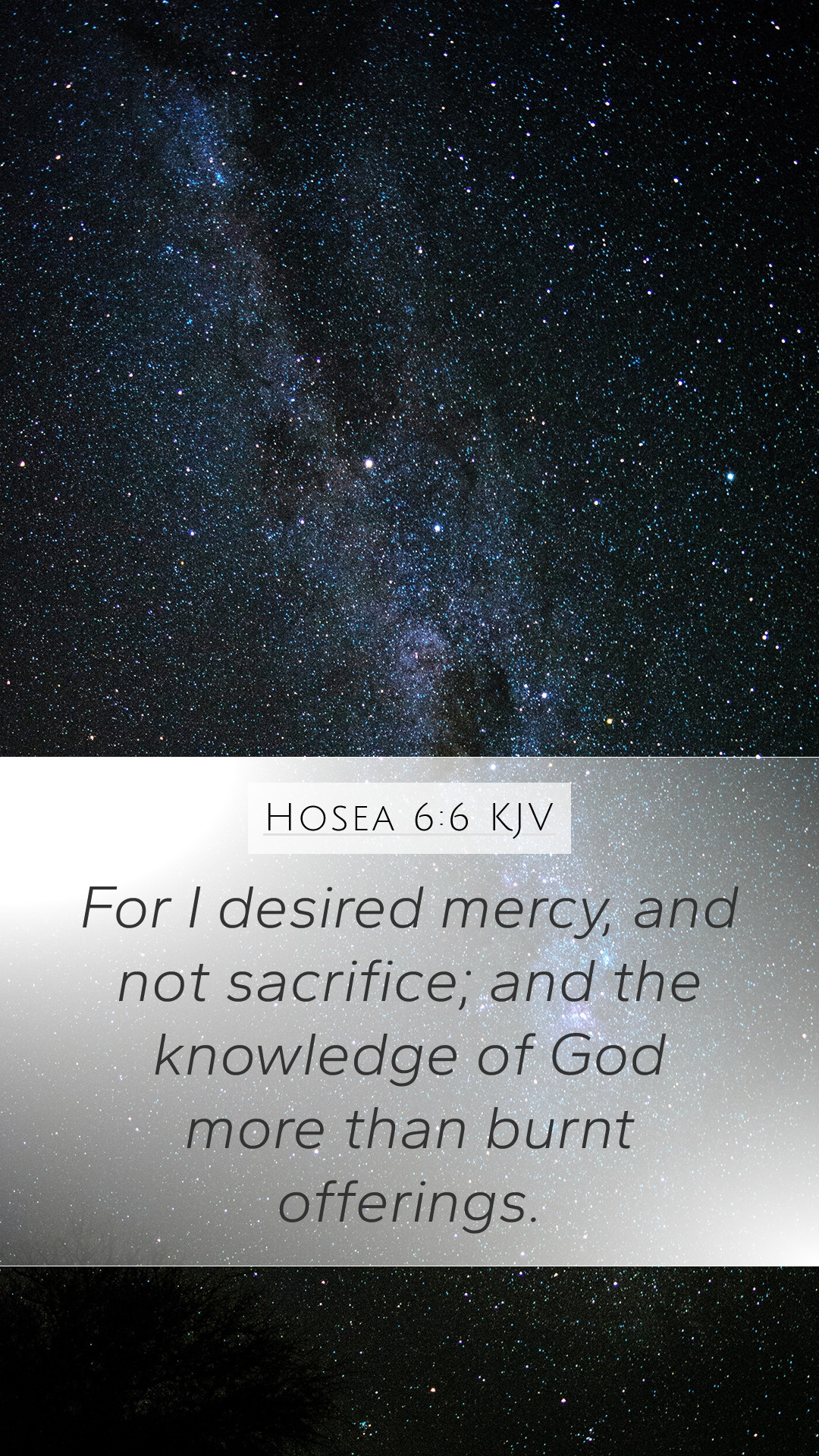Old Testament
Genesis Exodus Leviticus Numbers Deuteronomy Joshua Judges Ruth 1 Samuel 2 Samuel 1 Kings 2 Kings 1 Chronicles 2 Chronicles Ezra Nehemiah Esther Job Psalms Proverbs Ecclesiastes Song of Solomon Isaiah Jeremiah Lamentations Ezekiel Daniel Hosea Joel Amos Obadiah Jonah Micah Nahum Habakkuk Zephaniah Haggai Zechariah MalachiHosea 6:6 Meaning
What is the meaning of Hosea 6:6?
For I desired mercy, and not sacrifice; and the knowledge of God more than burnt offerings.
Hosea 6:6 Bible Verse Meaning
Bible Verse Meaning: Hosea 6:6
Verse: "For I desire mercy, not sacrifice, and acknowledgment of God rather than burnt offerings." (Hosea 6:6)
The scripture in Hosea 6:6 underscores a profound theological principle that emphasizes God's desire for a relationship rooted in love and mercy rather than mere ritualistic practices. It reflects God's longing for true devotion from His people, highlighting the importance of inner piety over external compliance.
Interpretation of Hosea 6:6
This verse can be understood as a significant critique of empty religious practices. As noted in various commentaries:
- Matthew Henry: He emphasizes the notion that God prioritizes a heart of compassion and a genuine understanding of His nature over ceremonial observance. The heart behind religious acts is what truly matters to God.
- Albert Barnes: Barnes points out that sacrifices without acknowledgment of God's sovereignty and His attributes are meaningless. He promotes a deeper understanding of faith, one that fosters a relationship based on knowledge of God and reflection of His character.
- Adam Clarke: Clarke adds that the "mercy" mentioned in this verse is indicative of a loving spirit, urging that God desires our heartfelt commitment and moral responsibility rather than mere ritual sacrifices.
Significance of Hosea 6:6
This verse embodies a pivotal theme throughout the Scriptures: the call for authenticity in worship and devotion. It addresses the nature of true faith and underscores a vital aspect of spirituality—that God values our hearts and intentions more than our outward expressions of faith.
Key Themes
- Mercy vs. Sacrifice: The contrast indicates that while sacrifices are part of the Old Testament worship, they cannot replace the need for a merciful heart.
- Knowledge of God: The call to acknowledge God highlights the necessity of understanding who He is and what He desires from humanity.
- Genuine Worship: This verse advocates for worship that stems from authenticity, rather than ritualistic redundancy.
Bible Verse Commentary
In discussing the commentary on Hosea 6:6, we recognize that this verse acts as a corrective mechanism for a people whose worship had devolved into mere tradition. It interrogates the values of ritualism and redirects focus toward a relational understanding of God.
Line-by-line Analysis
“For I desire mercy”: This phrase indicates that God's expectations surpass the mechanical fulfillment of religious duties. It introduces the essential quality of mercy that should characterize our interactions with others.
“not sacrifice”: Here, sacrifice refers to the ritual offerings instituted in the Law of Moses. God’s disregard for these rites indicates that He seeks authentic faith over mere compliance.
“and acknowledgment of God”: Acknowledgment is about recognizing and understanding God’s nature, which should influence our behaviors and relationships.
“rather than burnt offerings”: This emphasizes that rituals devoid of meaningful context or heart are insufficient for a right relationship with God.
Application of Hosea 6:6
This verse challenges us to reconsider our own spiritual lives by asking the following questions:
- Are we engaging in acts of worship that reflect our understanding and love for God?
- Do our religious activities translate into acts of kindness and mercy towards others?
- How can we deepen our knowledge of God as reflected in His desires for us?
Cross References
- Matthew 9:13: "But go and learn what this means: 'I desire mercy, not sacrifice.'"
- Micah 6:6-8: Addresses the issue of what God requires from His people, focusing on justice, mercy, and humility.
- 1 Samuel 15:22: "To obey is better than sacrifice..." reinforces the importance of obedience over ritual.
Conclusion
Hosea 6:6 serves as a compelling reminder in our Bible study endeavors that understanding the deeper meaning behind biblical texts enriches our faith and practice. This verse invites us to a lifestyle that honors God through mercy and genuine acknowledgment rather than mere religious activity.


